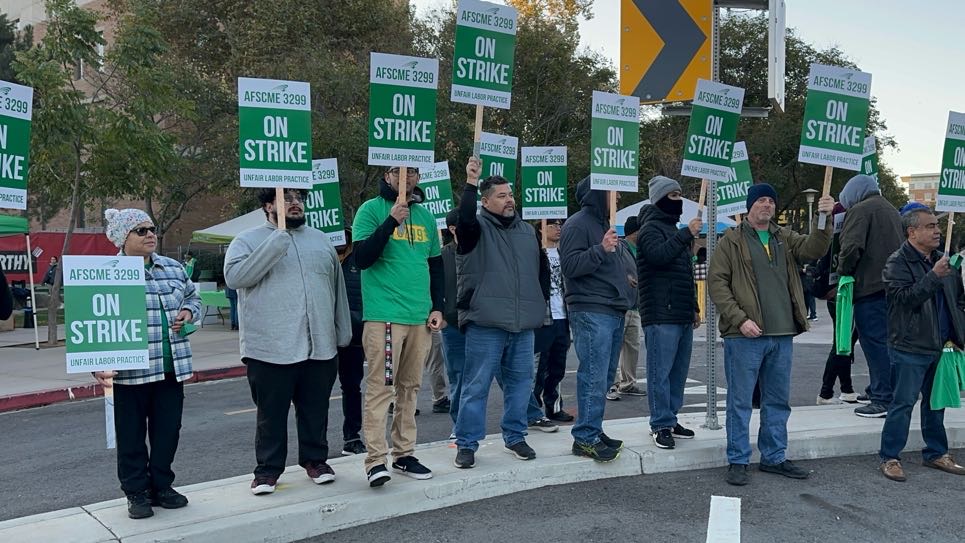
Front-line service and patient care workers at the University of California system who are members of AFSCME Local 3299 are striking Wednesday and Thursday tomorrow to protest what they call the university’s bad-faith bargaining.
The more than 37,000 workers affected at the university’s 10 campuses, five medical centers, clinics and research laboratories throughout California have been negotiating a new collective bargaining agreement with their employer since the beginning of the year. Back in August, they joined picket lines and strikes after they hit an impasse over negotiations.
The statewide strike that began Wednesday was authorized with 99% of members voting in support. It comes just weeks after the local filed formal charges alleging that the university administration has engaged in unfair labor practices.
AFSCME President Lee Saunders joined the striking workers at UCLA.
“It’s a fight for dignity and respect! A fight not just to get by but to get ahead,” Saunders said in prepared remarks. “You make sacrifices every single day to help UC meet its mission. UC shouldn’t expect you to take a vow of poverty on top of that. … It’s time for UC to end the bad faith bargaining and to show you the dignity and respect you deserve!”
Local 3299 President Michael Avant Jr., who’s also an AFSCME vice president, said the university is failing to meet its most basic responsibilities.
“The epidemic of understaffing at UC facilities, and the related cost of living and housing affordability crises plaguing front-line UC workers, are only getting worse,” Avant said, according to a Local 3299 press release. “By failing to meet its most basic responsibilities to the dedicated professionals who clean its facilities, serve students food, and treat its patients, UC has left workers with no choice but to exercise their legal right to strike.”
The workers are facing real-life challenges that Local 3299 members say the university refuses to acknowledge. For example, according to a report by AFSCME researchers, more than two-thirds of the workers meet the U.S. Department of Housing and Urban Development’s standard of “low” or “very low” income, double the number in 2017. Also since 2017, the number of such workers who are eligible for federal housing vouchers has nearly tripled.
Instead of recognizing that its workforce is struggling, the university administration has sought to punish the union and its members, according to Local 3299. Among other things, UC unilaterally increased health care costs by hundreds of dollars every month for workers who are barely making ends meet, refused to provide critical staff vacancy and financial information needed for constructive negotiations, and sent representatives to bargaining sessions who are unprepared or lack the authority to negotiate.
“For the past year, we have worked to engage in good-faith bargaining over the job quality needs of our members, and the growing staff vacancy crisis that is eroding the quality of services at UC campuses and hospitals,” Avant said. “Instead of being a constructive and transparent partner seeking to bring us closer to agreement, UC has sought to drive us farther apart by withholding critical information, showing up unprepared and without authority to compromise, and by seeking to unilaterally impose health care cost increases that will function as a wage cut on workers already struggling to survive.”
Local 3299 voluntarily barred several dozen critical care workers from strike activity and created a patient protection task force to support emergency patient needs during the strike. The local represents more than 37,000 service and patient care technical workers throughout the UC system.
